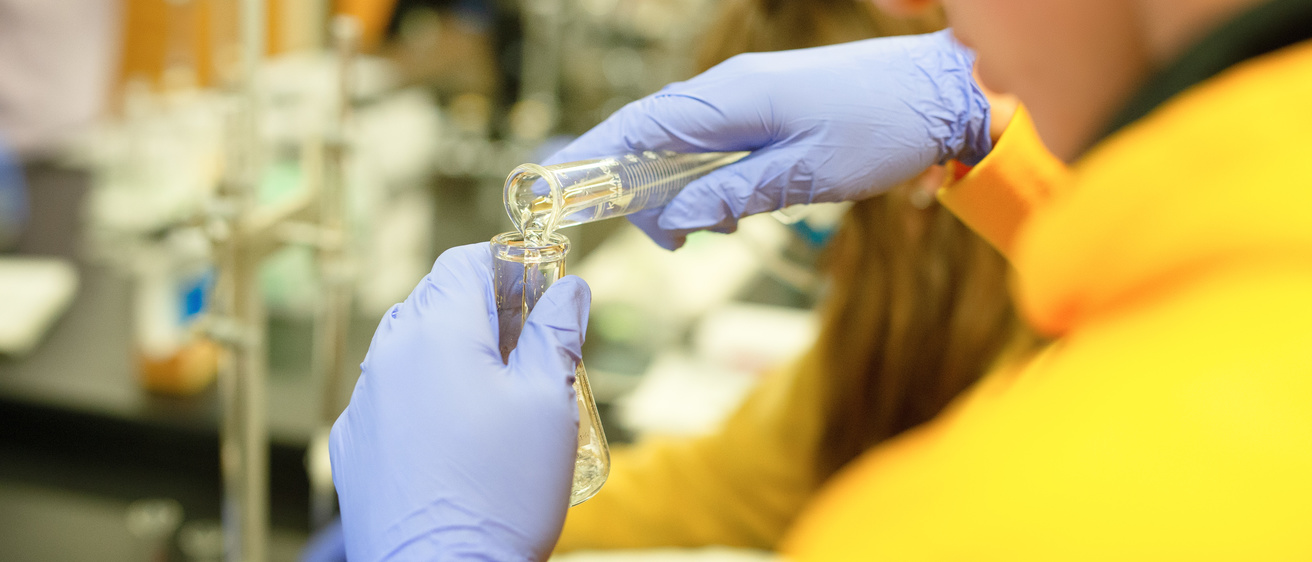Biochemistry is the study of the basic biological and chemical processes that occur in all living systems. It is an area suited to students who enjoy science and math and who may be considering a career as a research scientist. A Biochemistry and Molecular Biology degree is solid preparation for advanced-degree science programs and for careers in medicine, biology, chemistry, or dentistry.
Iowa’s Biochemistry and Molecular Biology Program focuses on individual students. It is designed to develop creative researchers, effective physicians and other health professionals, and excellent teachers. The major has a strong liberal arts emphasis, which provides a broad-based foundation for careers and advanced study.
Biochemistry and Molecular Biology students study with research-oriented faculty who make themselves available for informal meetings with their students. You will have access to the department's research facilities. You'll also be able to join the Biochemistry Undergraduate Majors Club, where you can learn about biochemistry careers and graduate study.
The Department of Biochemistry and Molecular Biology is one of the basic science departments of the university's Carver College of Medicine. Its faculty are internationally known. They supervise research in biochemistry, molecular, cellular, developmental, computational, and structural biology. Their research is supported by agencies such as the National Institutes of Health, the National Science Foundation, the American Heart Association, and the American Cancer Society.
Students interested in this major must meet the requirements for admission to the College of Liberal Arts and Sciences.
Information

First-Year

Transfer

International
Within six months of graduating, 96 percent of Iowa graduates are employed, continuing education, or not seeking work. Our Pomerantz Career Center offers multiple resources to help students find internships and jobs.
Iowa's Biochemistry and Molecular Biology Program offers solid preparation for careers in medicine, biology, chemistry, dentistry, research, or related sciences. About one-third of Biochemistry majors go on to study medicine. Others enter graduate programs, professional degree programs, or find jobs in industry and research.
Biochemists with advanced degrees work in teaching and research. They also pursue administrative careers at universities, medical schools, hospitals, government laboratories, private research agencies, biotechnology companies, and in food, drug, cosmetics, chemistry, petroleum, and other industries.
In addition to more than 600 Student Organizations, Iowa students choose from more than 100 Study Abroad Programs and multiple Undergraduate Research Opportunities.
Internships
Biochemistry and Molecular Biology students are encouraged to apply for internships in industry to gain additional research experience and become familiar with the industrial research setting. Students also can apply for part-time jobs in the Department of Biochemistry and Molecular Biology, where they assist in ongoing research projects.
The University of Iowa provides a variety of scholarships to eligible undergraduate students through the Iowa Scholarship Portal. Scholarships are available to first-year, transfer, and currently enrolled students. For additional details on scholarships for your program of study, check directly with the department or college.
The Office of Admissions and the Office of Student Financial Aid are great resources for students seeking scholarships.
Iowa offers a Bachelor of Arts (BA) or a Bachelor of Science (BS) degree in Biochemistry and Molecular Biology. About 200 students major in Biochemistry and Molecular Biology.
To maximize student flexibility, the curriculum for the BA with a major in Biochemistry and Molecular Biology is identical to the BS degree in the first two years of study.
The BA program provides a rigorous education in biochemical concepts and practice in the laboratory while allowing the flexibility to specialize in additional disciplines or obtain clinical volunteer experience. The BA degree in Biochemistry and Molecular Biology is intended for most students, including those with Pre-medicine, Pre-pharmacy, Pre-dental, and other pre-health professional majors, and for students with double majors.
The BS degree is intended primarily for students planning a career in research, including those with a long-term goal of attending graduate school (MS, PhD, MD/PhD) or obtaining a job as a research technician.
BA and BS students must complete the College of Liberal Arts and Sciences GE CLAS CORE requirements in addition to the following courses:
- Foundations of Biology and Diversity of Form and Function
- Principles of Chemistry I–II
- Organic Chemistry I–II
- Organic Chemistry Lab
- Calculus I–II
- Physics I–II
- Biochemistry and Molecular Biology I–II
- Experimental Biochemistry
- Advanced science electives (BA students take two courses, BS students take three)
- Physical Chemistry or Biophysical Chemistry (BA students take one course, BS students take two)
Students in the BS program also take:
- Development of Senior Research Project
- A research and independent study course or lab-intensive advanced science courses
Majors are encouraged to do lab research in biochemical areas of interest and many engage in one-on-one lab research. Interested students can become affiliated with one of the department's active research laboratories early in the curriculum by taking independent study or honors courses.
In addition to offering a core of coursework in Biochemistry, this field is interdisciplinary and also involves the study of Biology, Chemistry, Physics, Mathematics, and Computer Science.
